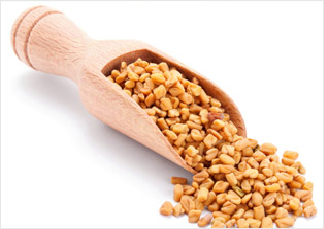Fenugreek
Fenugreek

Fenugreek is a plant in the family Fabaceae, also known as Trigonella foenum-graecum, Greek hay seed, methi (in India) and bird’s foot. It is an herb that is commonly found growing in the Mediterranean region of the world. While the seeds and leaves are primarily used as a culinary spice, it is also used to treat a variety of health problems as an herbal supplement in Egypt, Greece, Italy, and South Asia, esp India.
Fenugreek has been found to contain protein, vitamin C, niacin, potassium, and diosgenin – a compound that has properties similar to estrogen. Other active constituents in fenugreek are alkaloids, lysine and L-tryptophan, as well as steroidal saponins -diosgenin, yamogenin, tigogenin, and neotigogenin.
TOP HEALTH BENEFITS OF FENUGREEK:
Helps in reduction of Cholesterol – Fenugreek contains saponins that help reduce the body’s absorption of cholesterol from fatty foods, reduce the body’s production of cholesterol, especially the harmful low density lipoprotein (LDL) levels.
Prevents Diabetes – Fenugreek contains a rare amino acid (4HO-Ile) that has anti-diabetic properties. It enhancing insulin secretion under hyperglycemic conditions (for type 1 diabetes) and increasing insulin sensitivity (for type 2 diabetes). Also galactomannan, a natural soluble fibre, present in fenugreek slows down the rate of sugar absorption into blood.
Protection from Cancer – Fenugreek has estrogenic effects and is a possible alternative to hormone replacement therapy (HRT). Saponins and mucilage in fenugreek bind to toxins in the food and flush them out, thus protecting the mucus membrane of the colon from cancers. Eases Labor Pains: Fenugreek stimulates uterine contractions, reduces labor pain, and eases child birth process.
Helps Women’s Health Complaints: Compounds like diosgenin and isoflavones, with oestrogen-like properties, help reduce menstrual cramps associated with PMS, ease menopausal symptoms like hot flushes and mood fluctuations. Abundance of iron in fenugreek covers up the iron deficiency during adolescence (initiation of menstrual periods), pregnancy and breastfeeding.
Boosts Testosterone Levels in Male – Significant positive effects of fenugreek on physiological aspects of male libido have been noted. It assists in maintaining healthy testosterone levels and helping in erectile dysfunction.
Promotes healthy Digestion – The mucilage in fenugreek seeds is effective against heartburn or acid reflux and soothes gastrointestinal inflammation, relieves indigestion, treats constipation, digestive problems created by stomach ulcers, and coats the stomach and intestinal lining.It also detoxifies the liver and kidneys.
Weight Loss -This thermogenic herb, with its natural soluble fiber, galactomannan, aids weight loss by suppressing appetite, providing quick energy, and modulating carbohydrate metabolism. It also helps flush out harmful toxins.
Hair Care – Fenugreek contains lecithin that hydrates the hair, reduces the dryness of the hair, cures dandruff, conditions the hair, and treats a variety of scalp issues which makes our hair healthy and strong.
Skin Care – Fenugreek has antiseptic and anti-inflammatory properties which draws out toxins accumulated underneath the epidermis and tones the outer layers of the skin and is traditionally used as a remedy for eczema, burns, abscesses, gout, skin inflammation, scars, blackheads, pimples, wrinkles, and cystic acne.
Heart Care – Fenugreek seed contains galactomannan (a polysaccharide), that lowers the risks of a heart attack. It is also an excellent source of potassium which counters the action of sodium to help control heart rate and blood pressure.
Nutrient source – Fenugreek seeds are rich source of trigonelline, lysine, l-tryptophan, saponins, fibers, high content of Vitamin A and C, calcium, iron, proteins, carbohydrates and trace minerals.
Interactions :
While Fenugreek is generally considered to be safe when used moderately, there have been reports of a few minor side-effects. Nausea is one common side effect, while other people have reported gastrointestinal discomfort (diarrhoea and/or gas). Also, when using this herb topically on the skin, it is important to watch out for skin irritations and rashes.
Fenugreek use during pregnancy is not recommended, since it has the potential to induce labor. If you are pregnant and wish to take it, you should do so only after consultation with your doctor.
If you are currently taking any oral medications, you should always use this herb at least 2 hours before or after these drugs. This is important since Fenugreek fibre has the potential to interfere with the absorption of oral medications due to its mucilaginous fibre (which gives it a moist and sticky texture).
Fenugreek : #My Tips

In Indian households, fenugreek is frequently used, both the seeds and leaves of methi (fenugreek) in lentil curries, lentil soups, dals, parathas, naan breads and various dishes. You can use fresh leaves, seeds or even dried leaves of fenugreek and equally gain all the benefits from it.
Fenugreek helps flush out harmful toxins. It relieves indigestion and helps treat constipation. So take 15 fenugreek seeds daily after dinner or at bedtime. One teaspoon of fenugreek seeds in your food daily can be an effective remedy for acid reflux or heartburn.
A very useful herbal solution for Skin irritation and Inflammation that is tried and tested by generations in India is to take a spoonful of fenugreek seeds and grind them into a powder. Mix this ground powder with warm water and drink once a day, this is particularly helpful for skin aliments
Research has shown that Fenugreek is an effective topical treatment for skin problems such as abscesses, boils, burns, eczema, and gout. Fenugreek is particularly good for hair and skin because it has a compound with oestrogen-like properties called diosgenin. It is also rich in proteins, vitamin C, iron, fibre.
